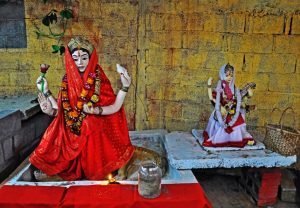Exploring the link between Big Gods, Potent Rituals, Large-Scale Cooperation and the Origins of Complex Societies
 This project was designed to explore the relationship between certain elements of religions, like supernatural beliefs and rituals, and prosocial behavior. More specifically, do different elements of supernatural agents (e.g. fear of supernatural punishment, attributed breadth of knowledge, attributed concerns) moderate or mediate the impact of belief in those agents on prosocial behavior? When effective secular judicial institutions are present, do they reduce the impact of belief in those agents? How do cognitive systems affect commitment to supernatural agents? By combining a battery of tasks, many of which assess elements of religion, with both experimental tools and social network measures we aim to address these questions. By gathering these data in many places around the world, we will be able to begin to tease apart the underlying mechanisms and boundary conditions of religiously motivated prosociality. Of course, the work will also address when and where religious elements like supernatural agents and rituals are not connected to prosociality at all.
This project was designed to explore the relationship between certain elements of religions, like supernatural beliefs and rituals, and prosocial behavior. More specifically, do different elements of supernatural agents (e.g. fear of supernatural punishment, attributed breadth of knowledge, attributed concerns) moderate or mediate the impact of belief in those agents on prosocial behavior? When effective secular judicial institutions are present, do they reduce the impact of belief in those agents? How do cognitive systems affect commitment to supernatural agents? By combining a battery of tasks, many of which assess elements of religion, with both experimental tools and social network measures we aim to address these questions. By gathering these data in many places around the world, we will be able to begin to tease apart the underlying mechanisms and boundary conditions of religiously motivated prosociality. Of course, the work will also address when and where religious elements like supernatural agents and rituals are not connected to prosociality at all.
The first wave resulted in an article in Nature, as well as a special issue of Religion, Brain and Behavior:
Purzycki, B. G., Henrich, J. and Norenzayan, A., eds. (2018). The Evolution of Religion and Morality [special issue]. Religion, Brain and Behavior, 8(2): 101-261.
Central Hypotheses
The present protocol includes instructions for the experiments and a host of measurement instruments designed to test some the following hypotheses motivating the larger project.
1) Gods and Prosociality: Belief in, and reminders of, gods who are more (1) omniscient, (2) morally involved in human affairs involving strangers (concerned about cheating, lying, etc.), and (3) punitive are associated with more positive prosocial behavior towards co-religionists, including more generosity and less cheating.
2) Secular Institutions and Prosociality: The presence, or reminder, of reliable secular institutions that promote cooperation (police, courts) moderate these effects, such that the impact of moralizing gods on prosociality—particularly on third-party punishment—is weaker when secular institutions are strong. This may occur through several potential mechanisms, which we will explore.
3) Mentalizing and Gods’ Minds: The impact of moralizing gods on prosocial behavior is accentuated among individuals with more finely-tuned theory of mind abilities and heightened public self-awareness (the feeling of being under surveillance), and these are in turn related to tendency to attribute person-like mental states, agency, and intentions to God.
4) Prosociality and Religious Group Boundaries: The impact of moralizing gods on prosocial behavior is influenced by religious group boundaries such that prosociality is curtailed as religious affiliation differences increase.